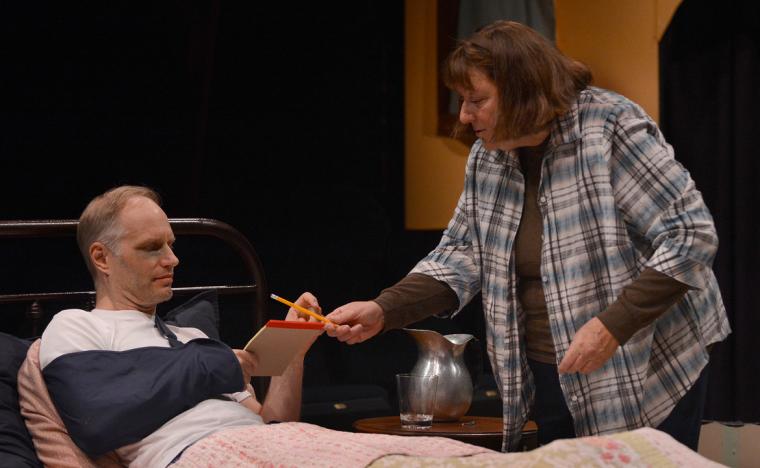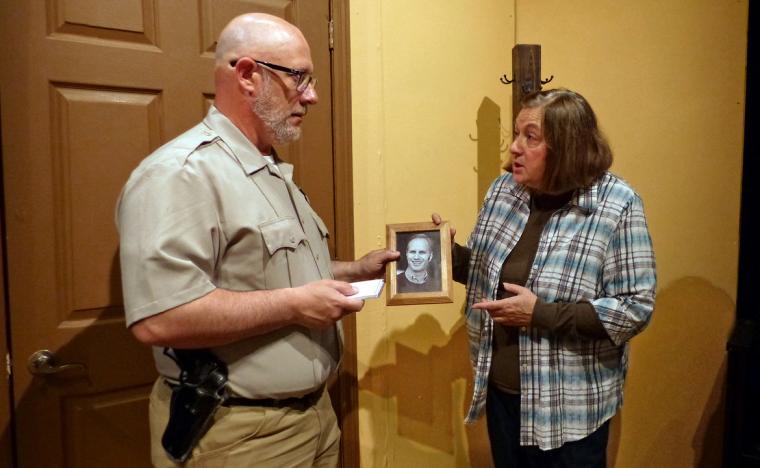
Jackie Skiles and Jonathan Grafft in Misery
Misery is one of those scripts that I had been hoping to see staged somewhere, and the Richmond Hill Players’ intimate venue was the perfect environment in which to produce it. Led by director Dana Skiles, Saturday's performance was polished, entertaining, and high-quality. The intensity of the scenes, practical and special effects, stage combat, and dark humor are all things that probably proved a challenge, but Richmond Hill’s presentation rose to the occasion and delivered these elements without misery. In fact, the experience overall was quite the opposite of miserable.
Before getting into more specifics, William Goldman's writing of this script based on Stephen King’s novel is worth mentioning. I had been involved in a high-school production of Carrie and love King’s storytelling. The author always builds multi-faceted characters, and works in the horror genre with deep psychological and social complexity. Not every work of his would be a good fit for the stage. (I don’t think ... though let’s see an It musical and maybe I’ll change my mind!) But this two-hander-plus-one really works well, and it's intriguing to watch visceral torturous effects in a tangible theatrical space.
Misery opens with Paul Sheldon (Jonathan Grafft), a famous author of the fictitious “Misery Chastain” series, injured and confined to a bed in the countryside home of Annie Wilkes (Jackie Skiles), who claims she’s his number-one fan. Annie takes care of Paul, but we quickly realize that she’s controlling and abusive, and she ultimately uses physical torture to control Paul’s writing when the last novel of her beloved series is released and is not up to Annie’s standards. Paul, held captive, is left fighting for his life and a way out.

Grafft was dynamite in his role, with Paul’s build of desperation, pain, and urgency performed at just the right pace. The character's painful reactions and physical struggle can't be easy to pull off, but Grafft did so, and with great control of his voice and body. The actor never left the stage (except occasionally during blackouts) and really kept the audience along for the ride, and while a lot of the dark humor came from Annie, Paul brought a small recurring joke to the story. Whenever Annie brought him food, the audience could tell Paul found it disgusting, as he made faces and spit it out when Annie wasn’t looking. This added to the zaniness of the whole situation – that even the slightest bit of actual care on Annie’s part also fails.
Equally commanding in her role as Annie, Jackie Skiles' creepy characterization had so many sides and was dynamically involving. The intense torturous moments that were oftentimes spoken calmly; her off-putting enthusiasm; her obsessive relationship with Paul and his stories; the increasing momentum of her ruthlessness. All this and the forward suspense-building of the story made Skiles’ performance really wonderful.
The visual picture of this piece, in terms of the characters’ eye contact, was interesting. When Grafft and Skiles weren’t looking at or directly talking to one another, their lack of eye contact and expressions told us something different from what their words were saying. These bits that were hidden from one another were really enjoyable to follow, and added to the audience’s experience of fully leaning into Misery's story. Grafft and Skiles had great chemistry and set each other up well for theatrical beats, shifting scene power and meeting each other in the tension between their characters,
A recurring walk-on figure, Sheriff Buster (Patrick Kelley) added a lot to the suspense, as well, as we knew this could be Annie’s end and Paul’s way out. I’m not going to ruin how the story concludes, but when all three of them are on-stage together in a specific scene, director Dana Skiles' stage picture and blocking were perfect for the in-the-round space. From where I was sitting, I couldn’t see certain characters enter the space until I turned my head toward one of the entrances, and this specific scene made that versatility of space really fun for the audience.

Misery's playing area was also physically split by a semblance of a wall and door that separated Paul’s room and the outside hallway. This design choice isolated Paul and allowed two scene spaces and character isolation to happen at once; they both felt closed off in their worlds, but both seen by the patrons. Unfortunately, the construction and paint on this wall along the bottom was left unfinished, which was disappointing considering the rest of the show’s detail was so evident. The inviting, pastel colors of the bedspread, for example, were a charming and non-obvious choice, but matched Annie Wilkes’ personality quite well.
Director Skiles' makeup design was incredible. Paul, at the beginning of the show, is seen with believable cuts across his face, and as the play progresses, we see frighteningly realistic leg bruises. And the most impressive design elements were the special effects. This production employed actual fire numerous times, and for different purposes, and a couple of times it was block-lettered FIRE with momentarily huge flames. This feat was impressive and caught me off-guard, yet the effect was controlled enough to not have me scared about the potential of an old wooden barn theatre aflame.
Richmond Hill’s Misery is a professional-quality, darkly enjoyable theatrical experience. A venue that can do Drinking Habits 2 and Stephen King in the same season, and equally entertain with both, must be doing something right.
Misery runs at the Richmond Hill Barn Theatre (600 Robinson Drive, Geneseo IL) through June 11, and more information and tickets are available by calling (309)944-2244 and visiting RHPlayers.com.








